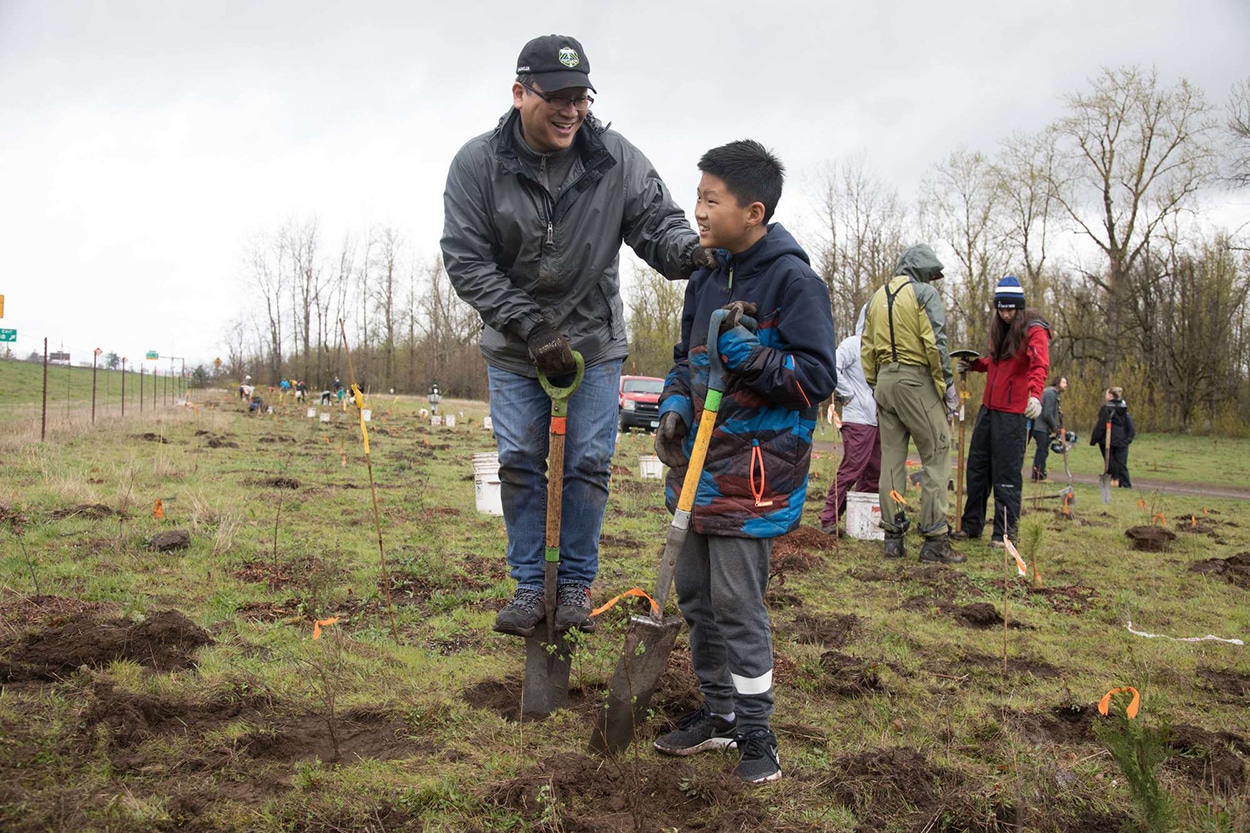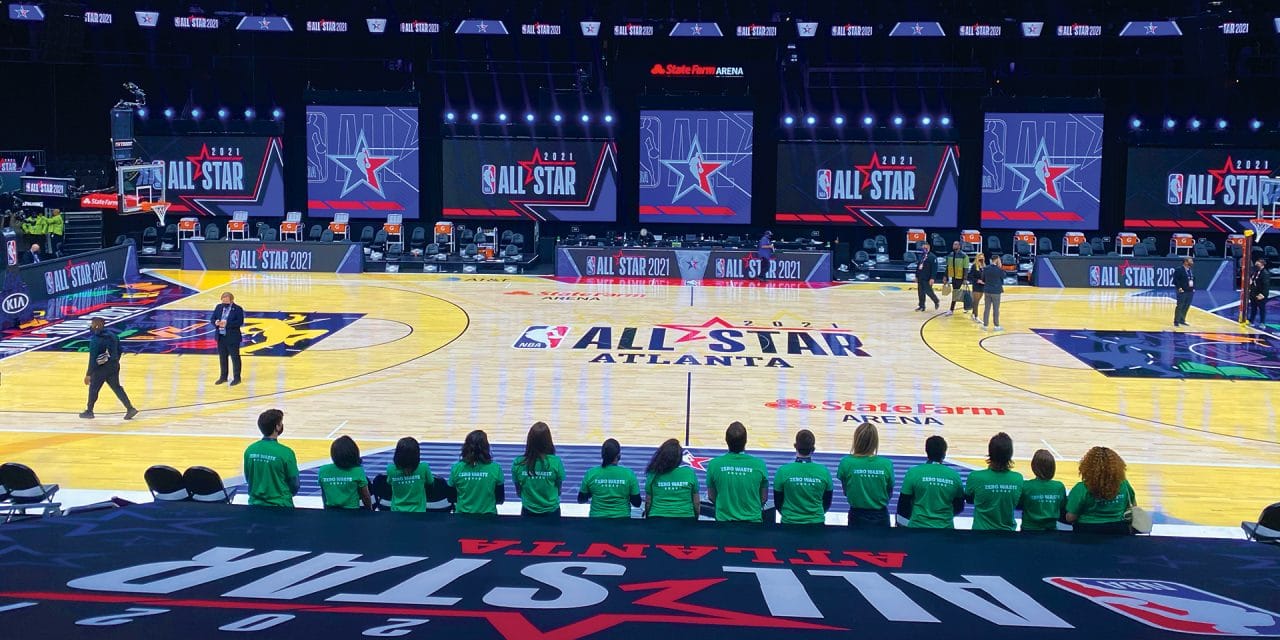ZEROING IN: The Atlanta Hawks and State Farm Arena played host to the first zero-waste NBA All-Star Game on March 7. (Courtesy Atlanta Hawks)
Pandemic Won’t Stall Interest in ‘Operating the Right Way,’ Experts Say
In light of the coronavirus pandemic, must sustainability take a back seat to health and safety when it comes to public assembly facilities and the events they house?
 While some say something’s got to give during the unprecedented economic damage wrought by the global spread of the virus that causes COVID-19, others believe the green initiatives are not only compatible but also integral to health and safety.
While some say something’s got to give during the unprecedented economic damage wrought by the global spread of the virus that causes COVID-19, others believe the green initiatives are not only compatible but also integral to health and safety.
The Atlanta Hawks and State Farm Arena, for instance, hosted the first zero-waste NBA All-Star Game on March 7, with 97% of fan-generated waste diverted from landfills. Events with a diversion rate topping 90% and with diverted materials being reused, recycled and composted are generally considered zero waste.
The Hawks teamed with Rubicon, whose software platform offers smart waste and recycling solutions for businesses and governments as well the Center for Hard to Recycle Materials, which has assisted in creating recycling solutions for the city of Atlanta.
“What made it achievable was the fact that our supply chain was in place,” said Sofi Armenakian, director of operations and sustainability for the Hawks and State Farm Arena. “That really goes to our partners at Levy (State Farm Arena’s food and beverage provider). Our procurement has enabled us to be able to divert. We could have spent all of the hours in sorting and have all the technologies to sort, but if what you are sorting is not divertible, which means it cannot be recycled or composted, then you could not achieve that. Our supply chain prior to this has been very green. We have compostable plastic and alternatives to single-use plastic, and that’s really what enabled it.”
Volunteers and those in back-of-house operations came together to make it all happen, she said.
Asked whether achieving zero waste is a more difficult task in light of the pandemic, with more prepackaged items as part of a shift over the last year in the way food service is done, Armenakian said it does present challenges.
“Not only that, but also all of the PPE. So, you have gloves and masks that are not necessarily recyclable, but there are solutions in place … to divert those,” she said. “The key is keeping them out of your streams of recycling and compost. You don’t want to contaminate your clean stream. So, it has made it more challenging, but it goes to show that if you were able to have an identified location for those items then it is achievable. Single-use plastic always makes it harder, but what we have done is we’ve added additional signage to our landfill containers that let our guests and back-of house folks know that all of the PPE must be disposed of in landfill (bins) instead of our compost and recycling.”
Having the bins in place along with signage to educate guests about what goes where is also essential, Armenakian said, but she added that signage and labels should be concise and that too many bins can lead to confusion among guests.
“You want to keep it really simple and easy,” she said. “You don’t want to have too many containers because that can complicate things.”
Even a well-intended person will toss items in the wrong direction if the instructions, signage and labels aren’t clear, Armenakian said.

GROWTH INDUSTRY: The Portland Trail Blazers and Moda Center participate in the Trees for Threes program. (Courtesy Portland Trail Blazers)
The NBA’s Portland Trail Blazers and the team’s home arena, Moda Center, located in the Rose Quarter complex, have been a leader in zero-waste events for a number of years and have launched or participated in such green initiatives as the Trees for Threes program, started in 2010 with the Dallas Mavericks, whereby a tree is planted for each three-point shot made by a team’s players. With the likes of Damian Lillard and C.J. McCollum on the Blazers, that makes for a lot of planting.
“What sustainability is is shifting in general,” said Katie Bailey, sustainability operations manager for the Rose Quarter and Trail Blazers. “For a very long time, venue sustainability has been focused on our utility use and minimizing that, and I still think that that is the foundation of every sustainability program and that data should still be the foundation, but I think beyond that, sustainability is evolving to now really look at the human impact of the things that we’re doing.
“So, I think health/safety is almost like an extension of sustainability and I think right now some of those practices are kind of at odds, but I think that is a space that is going to continue to grow and develop over the next few months to years as we navigate the pandemic.”
Scott Jenkins is a venue industry veteran who has held top-level positions with MLB’s Seattle Mariners and Milwaukee Brewers and the NFL’s Philadelphia Eagles and Atlanta Falcons before becoming executive vice president of strategic partnerships with lighting and clean air solution provider PlanLED Inc. Jenkins, co-founder of the Green Sports Alliance, says it’s inevitable that many venues must pull back, at least temporarily, from some of their green initiatives.
“I’d like to say no, (sustainability) doesn’t have to take a back seat, but I’d be lying,” he said. “The reality is we’ve been crushed as an industry. It’s impacted our staffing levels, our operating budgets, and COVID has caused our businesses to spend more money on cleaning, on testing, so it has had a big impact and I think it has set us back a little bit from a sustainability standpoint.”
Health and safety must be foremost in venue operators’ minds, and limited resources make for difficult choices, he said.
“If we start to run our handlers longer and bring in more outside air and increasing air exchanges per hour, yeah, we’re burning more fossil fuels to run our systems,” Jenkins said. “It is a step back from a carbon emissions standpoint and I think we don’t have a choice. But I will state, too, that I think this break in the past year and this pause has helped us stop to think about purpose and really what is the right way to go forward. Whether that’s environmental justice, social justice, sustainability, there’s a renewed interest in operating the right way and having a longer view of things. I think that’s going to help the sustainability element in the long run, but in the short term it’s been devastating on our businesses.”
Elaine Aye, associate regional manager with RWDI Consulting Engineers and Scientists and an expert in the Leadership in Energy and Environmental Design rating system and the Well Building Standard, is of the mind that sustainability is connected to health and safety.
“When you look at healthy buildings you’re looking at a variety of different areas from air quality, ventilation in the building, water quality, energy efficiency, creating opportunities for mindfulness, creating opportunities for nourishment in the building, movement in the building, sound/acoustics,” she said. “There’s a variety of different parameters when you look at how does a building effectively address these areas, and what COVID and the virus has taught us is that buildings play an essential role in the health and well-being of people and it’s going to continue to play a significant role as we look at people reentering the workforce or reentering into sports venues and stadiums.”
People will want to know more than if the venue has been sanitized and will welcome things like signage or videoboard messages explaining how many air exchanges there are per hour or that the water is safe to drink, Aye said.
“As humans we spend so much time in buildings, whether it be around home or in the past in office buildings and then just in buildings in general,” she said. “Buildings influence the choices that we make. If I’m at a venue and I want to grab something to eat I have a plethora of options, but what are the options that are really provided to me? Do those options nudge me to think about better nourishment for myself?”
Even in terms of selecting concessions or merchandise items, venue guests can be nudged toward sustainable options if informed what is packaged or made from recycled content, or sourced locally, she said, explaining that consumers will increasingly demand transparency.
“To me, sustainability is … embedded into how we design buildings, how we construct buildings and then how we eventually operate those buildings,” Aye said.
Aye pointed to the Green Sports Alliance among other trade associations and venue industry companies as playing a significant role in promoting, enabling and benchmarking venue sustainability, from fan engagement to waste diversion to building design and operation.
The U.S. Green Building Council has made it easier for venues to track their sustainability effectiveness through the Arc Skoru software platform it launched in 2016, Aye said.
Lara Seaver, director of projects at Reverb, a nonprofit organization dedicated to boosting sustainability among musicians, festivals and venues, says the green and climate change initiatives at venues are matters of urgency “and really can’t wait.”
“That doesn’t mean health and safety can’t be put first,” Seaver said. “We’ve learned so much about the virus in the last year. Surface transmission used to be our big concern and now we’ve learned that’s rare (if it’s happening at all). So, things like overpackaging foods aren’t as necessary as we might have worried that it would be for plastic. But there are so many sustainability issues that, I would say, maybe aren’t more important but, unrelated to that, that can be done safely, whether it’s using cleaner energy or offering plant-based options at concessions. That can still happen in tandem with ensuring that fans are kept safe.”
One skeptic of the popular notion of what makes for zero-waste events is also someone who has championed green causes and the battle against global warming for decades.
Michael Martin, founder and CEO of Effect Partners, produced national Earth Day concerts while running Concerts for the Environment 1990-95 and also created the first “green tour” with the Steve Miller Band in 1991. He has helped Live Nation and AEG develop their sustainability approaches.
He says, and many have noted, that recycling programs are broken in general, and that zero waste should mean just that, especially because items intended for recycling might not ever make it to reuse. He also casts a jaundiced eye on recyclable plastic, saying it doesn’t break down and become harmless.
“My company is really about macro system change,” he said.
He acknowledges that health and safety and wellness must come first, but adds that it falls in many respects “under the umbrella of sustainability.”
“You can’t have sustainability if you don’t have health, safety, wellness, justice,” he said. “Those are all really the same thing.”
So do you put your dollars into, say, hand sanitizer or a recycling bin? Martin responds that they’re “intersectional issues.”
He says that the plastics industry has opportunistically pushed a return to single-use bags and plastic items and that confusion in the marketplace over how the coronavirus is transmitted has prompted overpackaging and increased plastics use that has little effect on the spread of COVID-19.
“From my perspective trying to move the industry forward … it’s just so frustrating to see that happen,” he said.
Martin told Pollstar last year that developing the rentable r.Cup system – where r.Cup provides a high-quality drinking vessel and then handles all of the sanitization and logistics – was one of his top recent accomplishments.







